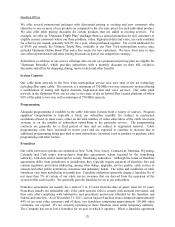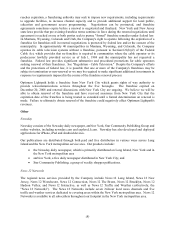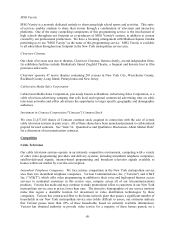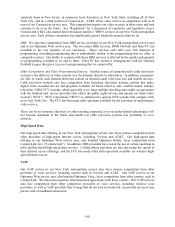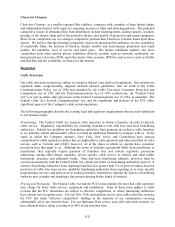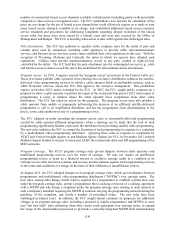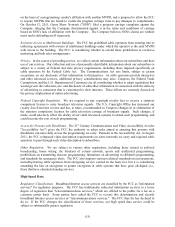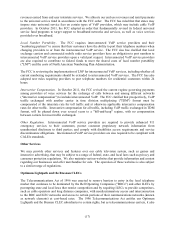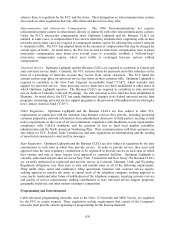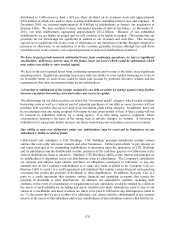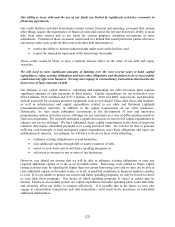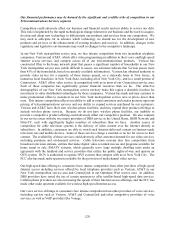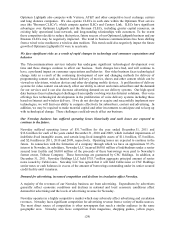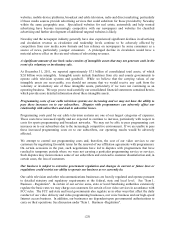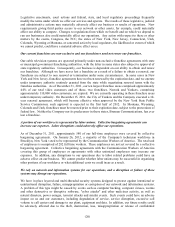Cablevision 2011 Annual Report Download - page 22
Download and view the complete annual report
Please find page 22 of the 2011 Cablevision annual report below. You can navigate through the pages in the report by either clicking on the pages listed below, or by using the keyword search tool below to find specific information within the annual report.(16)
Access Obligations and "Net Neutrality." In December 2010, the FCC adopted a net neutrality
framework applicable to broadband Internet access service that prohibits wireline broadband providers
from blocking lawful content, applications, services, or non-harmful devices, subject to reasonable
network management as defined by the rules; bars such providers from unreasonably discriminating in
transmitting lawful network traffic over a consumer's broadband Internet access service; and requires
them to disclose information about their broadband Internet access service and their network management
practices. These rules went into effect in November 2011. The rules have been challenged in federal
court. Some parties have advocated that the FCC also require broadband providers to make transmission
capacity available to third parties on a resale basis, but the FCC thus far has declined to do so.
Access For Persons With Disabilities. The Accessibility Act expanded requirements for broadband
Internet access services by ensuring that persons with disabilities have access to "advanced
communications services" ("ACS"), such as electronic messaging and interoperable video conferencing,
and extended closed captioning requirements to IP-enabled video services. Pursuant to the Accessibility
Act, in October 2011, the FCC adopted regulations governing advanced communications services, and in
January 2012, the FCC adopted rules requiring that video programming delivered via Internet Protocol
include closed captioning and requiring cable operators distributing such programming to end users to
pass through such captions and identify programming that should be captioned under the Accessibility
Act.
Other Regulation. Currently, the Federal Cable Act's limitations on our collection and disclosure of cable
subscribers' personally identifiable information also apply with respect to broadband Internet access
service provided by cable operators. Broadband Internet access service is also subject to other federal and
state privacy laws applicable to electronic communications. Additionally, providers of broadband
Internet access services must comply with the Communications Assistance for Law Enforcement Act
("CALEA"), which requires providers to make their services and facilities accessible for law enforcement
intercept requests. Various other federal and state laws apply to providers of services that are accessible
through broadband Internet access service, including copyright laws, prohibitions on obscenity, and a ban
on unsolicited commercial e-mail. Online content provided by Cablevision is also subject to these laws.
Other forms of regulation of high-speed Internet access service currently being considered by the FCC,
Congress or state legislatures include consumer protection requirements; additional privacy obligations,
as noted above; consumer service standards; requirements to contribute to universal service programs;
and requirements to protect personally identifiable customer data from theft.
VoIP
The regulatory obligations of VoIP services are the subject of periodic examination and review by FCC,
Congress, and state public service commissions. In 2004, for instance, the FCC initiated a generic
rulemaking proceeding concerning the legal and regulatory implications of IP-based services, including
VoIP services. The FCC has determined that VoIP services with certain characteristics, including cable-
provided VoIP services, are interstate services subject to federal rather than state jurisdiction. The FCC's
determination was upheld by a federal court of appeals although the court found that the FCC's order did
not squarely address the classification of cable-provided VoIP services. Although the FCC has not
concluded its generic rulemaking proceeding, it has applied some regulations to VoIP service providers
that have certain characteristics (these services are known as "interconnected VoIP services"). Some
states have asserted the right to regulate cable VoIP service, including imposing fees to support state
universal service programs, on the theory that in-state calls can be accurately distinguished from interstate
calls.
Universal Service. Interconnected VoIP services must contribute to the federal fund used to subsidize
voice services provided to low income households and rural areas and other communications services
provided to schools, libraries, and rural health care providers (the "universal service fund"). The amount
of universal service contribution for interconnected VoIP service providers is based on a percentage of



